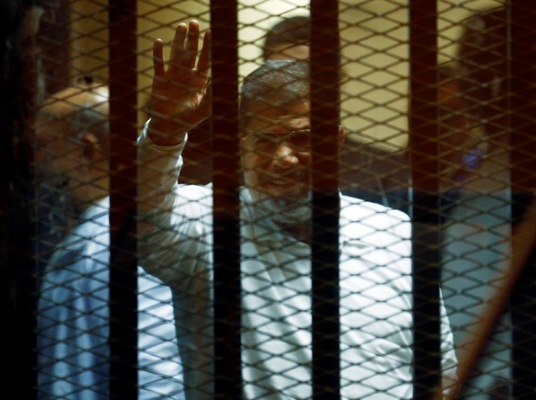Latest NEWS
- Aswat Masriya, the last word
- Roundup of Egypt's press headlines on March 15, 2017
- Roundup of Egypt's press headlines on March 14, 2017
- Former Egyptian President Hosni Mubarak to be released: lawyer
- Roundup of Egypt's press headlines on March 13, 2017
- Egypt's capital set to grow by half a million in 2017
- Egypt's wheat reserves to double with start of harvest -supply min
- Roundup of Egypt's press headlines on March 12, 2017
Mursi testifies in espionage case

Ousted Egyptian President Mohamed Mursi waves behind bars during a his trial with other leaders of the Muslim Brotherhood on charges of spying and terrorism at a court in the police academy on the outskirts of Cairo, November 18, 2014. REUTERS/Amr Abdallah Dalsh
CAIRO, Jan 18 (Aswat Masriya) – Egypt's ousted president Mohamed Mursi, among other Muslim Brotherhood figures, gave the court his testimony in the espionage case against him on Sunday.
Mursi and the 35 other defendants facing trial for espionage, disclosing state secrets to foreign countries, funding terrorism, conducting military training to serve an international branch of the Brotherhood, and "endangering the independence, unity and safety of the state."
Referring to his military ouster in July 2013 after mass protests against his rule, Mursi claimed that on July 3, he was held in the Republican Guard's headquarters until July 5 where he was taken to an area near Suez. Afterwards, the ousted president said he was taken to the Abu Qir naval base, where he stayed until the first session of his trial on November 4, 2013.
"[President Abdel Fattah] al-Sisi, the head of the [Supreme] Constitutional Court, and the minister of interior conspired against me and arrested me," Mursi said. He added that Former interim president Adli Mansour's "crime" was the "ugliest" because he agreed to disregard the constitution.
Mansour was the head of the Supreme Constitutional Court before he was declared interim president after Mursi's ouster. He returned to his judicial post after Sisi was elected as president last June.
"I was the president of the republic not a gang leader, and I put forth a constitutional declaration to protect state institutions," Mursi told the court.
A decree Mursi issued in November 2012 sacked the prosecutor general, gave immunity to the Shura Council, the constituent assembly drafting the constitution and Mursi's decisions from the judiciary and ordered the retrial of those responsible for killing "revolutionaries". The decree was widely denounced in nationwide protests as many saw it as a coup on legitimacy and democracy.
Mursi said that the reason he did not order the arrest of those "who killed the revolutionaries" in the 2011 Mohamed Mahmoud and Maspero clashes and other clashes that took place during the tenure of the Supreme Council of Armed Forces (SCAF) was that he "didn't want to be harsh on the military institution and let the law take its course."
Other defendants in the trial include Muslim Brotherhood Supreme Guide Mohamed Badie, his deputies Khairat al-Shater and Mahmoud Ezzat, as well as other group leaders and former presidential advisers. Sixteen defendants are being tried in absentia.
Mursi is implicated in a group of other court cases. He is being tried for inciting the killing of protesters outside the presidential palace during his tenure in December 2012, insulting the judiciary, escaping from the Wadi al-Natroun Prison during the 18-day January 25 uprising in 2011, and a separate espionage case
Mursi, two of his aides and eight others were referred to trial on September 7, 2014 over new espionage charges which involve leaking classified national intelligence to the Qatari intelligence.










